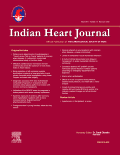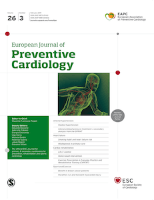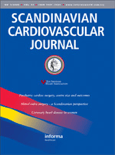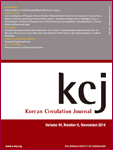
Journal of the American Heart Association
Scope & Guideline
Empowering Cardiologists with Cutting-Edge Discoveries
Introduction
Aims and Scopes
- Cardiovascular Epidemiology:
Research examining the distribution and determinants of cardiovascular diseases across populations, focusing on the impact of demographics, lifestyle factors, and medical history on cardiovascular health. - Clinical Trials and Interventions:
Studies evaluating the effectiveness of various therapeutic and preventive strategies in managing cardiovascular diseases, including pharmacological treatments and surgical interventions. - Mechanisms of Cardiovascular Disease:
Investigations into the biological and molecular pathways that contribute to cardiovascular conditions, enhancing the understanding of disease progression and potential therapeutic targets. - Health Disparities and Social Determinants:
Research exploring the impact of socio-economic factors, race, and ethnicity on cardiovascular health outcomes, aiming to identify and address inequities in care. - Innovative Technologies and Methodologies:
Development and application of new technologies and methodologies, such as machine learning and imaging techniques, to improve cardiovascular diagnostics and treatment. - Patient-Centered Outcomes:
Studies assessing the impact of cardiovascular interventions on patients' quality of life, functional status, and overall health outcomes.
Trending and Emerging
- Digital Health and Telemedicine:
A significant increase in research focused on the role of digital health technologies and telemedicine in managing cardiovascular diseases, particularly in the context of the COVID-19 pandemic. - Cardio-Oncology:
Growing interest in the intersection of cardiovascular medicine and oncology, examining the cardiovascular effects of cancer treatments and the management of heart disease in cancer patients. - Cardiovascular Health Equity:
An emerging emphasis on understanding and addressing health disparities in cardiovascular disease, recognizing the effects of social determinants of health on outcomes. - Neurocardiology:
Increasing research into the connections between neurological health and cardiovascular disease, particularly the impact of stroke on heart health and vice versa. - Lifestyle Interventions:
Research focusing on the impact of diet, exercise, and other lifestyle modifications on cardiovascular health outcomes, particularly in high-risk populations. - Precision Medicine:
A trend towards personalized treatment approaches in cardiovascular care, utilizing genetic and biomarker data to tailor interventions to individual patient needs.
Declining or Waning
- Traditional Risk Factor Studies:
Research focusing solely on conventional cardiovascular risk factors (like cholesterol levels and hypertension) has seen reduced emphasis, as the field shifts toward more integrative approaches that consider genetic, metabolic, and psychosocial factors. - Single-Disease Focus:
There is a waning interest in studies that explore cardiovascular disease in isolation, with a growing recognition of the need to address comorbidities and multi-system interactions. - Basic Science Research:
While foundational research remains important, there has been a noticeable shift towards translational and clinical studies that demonstrate direct implications for patient care and outcomes. - Invasive Procedures Alone:
As non-invasive and hybrid approaches gain traction, traditional invasive techniques are less frequently the sole focus of research, reflecting a broader trend towards patient safety and minimally invasive strategies.
Similar Journals

World Journal of Cardiology
Exploring the frontiers of cardiology and cardiovascular medicine.World Journal of Cardiology, published by BAISHIDENG PUBLISHING GROUP INC, stands out as a pivotal resource in the field of cardiology and cardiovascular medicine. With an ISSN of 1949-8462, this journal serves a global audience, promoting knowledge dissemination and collaboration among researchers, healthcare professionals, and students dedicated to advancing cardiovascular health. The journal demonstrates its credibility and impact in the field by achieving a respectable Q2 ranking in the 2023 category of Cardiology and Cardiovascular Medicine. Notably, it is listed in the Scopus database, ranking #189 out of 387 journals, placing it in the 51st percentile, which underscores its relevance and contribution to contemporary cardiovascular research. Although it operates under a subscription model, the journal provides diverse access options, ensuring that critical findings reach a wide audience. Through its comprehensive scope and commitment to publishing high-quality articles, the World Journal of Cardiology plays a vital role in shaping the future of cardiovascular science, making it an invaluable asset for those involved in this essential discipline.

Revista de la Federacion Argentina de Cardiologia
Driving progress in cardiovascular research and practice.Revista de la Federacion Argentina de Cardiologia is a vital publication in the field of Cardiology and Cardiovascular Medicine, providing a platform for researchers and healthcare professionals to share significant findings and innovative concepts since its inception in 2012. Published by the Federacion Argentina Cardiology, this journal specifically addresses contemporary issues and advancements within cardiology, contributing to the scholarly dialogue essential for improving cardiovascular health. Despite being categorized in the Q4 quartile for 2023 and presently ranking #358 out of 387 in its field, the journal remains committed to fostering academic inquiry and disseminating valuable research for both local and global audiences. Although it is not an open-access journal, it strives to balance accessibility with rigorous academic standards, ensuring quality contributions that are critical for practitioners and students alike. The journal’s ongoing evaluation and adaptation in the ever-evolving landscape of cardiology underscore its importance in advancing cardiovascular science and practice.

REVISTA ESPANOLA DE CARDIOLOGIA
Bridging Theory and Practice in CardiologyREVISTA ESPANOLA DE CARDIOLOGIA is a premier journal dedicated to the dynamic field of cardiology, published by EDICIONES DOYMA S A in Barcelona, Spain. With an impressive Q1 status in the Medicine (miscellaneous) category for 2023, this journal is recognized for its significant contributions to cardiovascular research, evidenced by its rank of #61 out of 387 in the Scopus database, placing it within the top 16% of journals in its field. Covering a broad range of topics within cardiology, the journal aims to disseminate high-quality research, clinical studies, and educational content, fostering knowledge sharing among researchers, clinicians, and students alike. While it does not currently offer open access, the journal maintains a commitment to advancing cardiovascular health through rigorous peer-reviewed articles. With a publication history that spans from 2013 to 2024, REVISTA ESPANOLA DE CARDIOLOGIA is an essential resource for those seeking to stay at the forefront of cardiology advancements and practices.

Journal of Cardiovascular Development and Disease
Transforming cardiovascular insights into impactful solutions.Journal of Cardiovascular Development and Disease, an esteemed publication by MDPI, has been a dedicated platform for disseminating cutting-edge research since its inception in 2014. Based in Switzerland, this Open Access journal not only provides unrestricted access to its content but also fosters global collaboration among scholars focusing on cardiovascular health and disease development. With an impressive focus classified as Q1 in Pharmacology, Toxicology and Pharmaceutics for 2023, it attracts a diverse range of interdisciplinary research, supporting advancements in pharmacological applications relevant to cardiac conditions. The journal's ongoing convergence through 2024 highlights its commitment to the evolving landscape of cardiovascular research, making it a vital resource for researchers, professionals, and students alike who are keen to contribute to and learn from significant developments in this critical field.

Indian Heart Journal
Advancing Cardiac Knowledge for a Healthier TomorrowIndian Heart Journal, published by Elsevier, is a distinguished peer-reviewed journal dedicated to the field of cardiology and cardiovascular medicine. Founded in 1961, this journal has been a pivotal resource for researchers, healthcare professionals, and students, providing a platform for innovative studies and insights into heart health. The journal transitioned to an Open Access model in 2013, ensuring widespread dissemination of vital research findings to enhance global understanding of cardiovascular diseases. Ranked in the Q3 category for Cardiology and Cardiovascular Medicine in 2023, it holds a reputable position in the medical community, with a Scopus rank of #222 out of 387 journals in the same field, placing it in the 42nd percentile. The Indian Heart Journal strives to foster advances in clinical practice and research while addressing the unique cardiac health challenges faced in India and beyond.

European Journal of Preventive Cardiology
Elevating knowledge in cardiovascular disease prevention.The European Journal of Preventive Cardiology, published by Oxford University Press, is a leading international journal dedicated to the field of cardiology and cardiovascular medicine. With an impact factor that underscores its prestige—ranking in the top quartile (Q1) of both cardiology and epidemiology categories—the journal serves as a critical resource for researchers and practitioners seeking to advance their understanding of preventive strategies in cardiovascular health. Since its inception in 1999, it has provided a platform for high-quality research and reviews that address the epidemiology of cardiovascular diseases, risk factor management, and innovative prevention methodologies. Notably, it currently ranks #21 out of 387 in Medicine - Cardiology and #13 out of 148 in Medicine - Epidemiology according to Scopus, highlighting its influential position in these essential biomedical fields. The journal also provides open access options, allowing both readers and authors the opportunity to engage with groundbreaking research and enhance the dissemination of knowledge. With a commitment to excellence, the European Journal of Preventive Cardiology is an invaluable asset for those dedicated to the prevention of cardiovascular diseases.

SCANDINAVIAN CARDIOVASCULAR JOURNAL
Elevating standards in cardiovascular healthcare and research.The Scandinavian Cardiovascular Journal, published by Taylor & Francis Ltd, is a distinguished peer-reviewed journal aimed at advancing the field of cardiology and cardiovascular medicine. With an impressive history dating back to 1967 and a forward-looking perspective until 2024, it has consistently contributed valuable research and insights, making it essential reading for anyone involved in cardiovascular healthcare. The journal holds a strong position in the academic community, reflected in its Q2 rating in both Cardiology and Cardiovascular Medicine, and a similar classification in the broader field of Medicine as of 2023. It is indexed in multiple databases, with a Scopus rank of #178 out of 387 in its category, placing it in the 54th percentile. The journal provides open access options, promoting wider dissemination of knowledge while supporting both researchers and practitioners dedicated to improving cardiovascular health. Its focus on high-quality, impactful research makes it an invaluable resource for professionals and students alike, keen to stay at the forefront of cardiology advancements.

Korean Circulation Journal
Elevating Cardiovascular Science Through Innovative Research.Korean Circulation Journal, published by the Korean Society of Cardiology, has established itself as a prominent platform for disseminating research in the fields of Cardiology and Cardiovascular Medicine. With an ISSN of 1738-5520 and an E-ISSN of 1738-5555, this journal has been at the forefront of cardiovascular science since its inception in 2006 and is projected to continue until 2024. The journal's commitment to quality is reflected in its 2023 category quartiles, ranking in the second quartile (Q2) for both Cardiology and Internal Medicine, as well as its commendable Scopus rankings within the respective fields. Located in South Korea, the journal aims to bridge the gap between cutting-edge research and practical applications, serving as an invaluable resource for researchers, healthcare professionals, and students keen on advancing their understanding of cardiovascular health. Although currently not an open-access journal, it provides a wealth of knowledge that encourages evidence-based practice in clinical settings.

Acta Cardiologica Sinica
Discovering Breakthroughs in Cardiac Health.Acta Cardiologica Sinica is a distinguished journal dedicated to the advancement of cardiology and cardiovascular medicine, published by the Taiwan Society of Cardiology. Since its inception in 1988, this journal has provided a platform for researchers and clinicians to share cutting-edge findings and insights into cardiac health, cardiovascular diseases, and innovative treatment strategies. With an impressive Q3 classification in the Cardiology category for 2023, the journal is recognized for its contributions to the field, ranked #208 out of 387 in Scopus, placing it within the 46th percentile of medical journals. Although it currently does not offer open access options, it remains a valued resource for the global cardiovascular community. The journal's commitment to disseminating high-quality research papers, reviews, and case studies ensures that it plays a vital role in improving cardiovascular health practices and outcomes. For researchers, professionals, and students alike, Acta Cardiologica Sinica is essential reading for staying informed about the latest developments in cardiology.

HEART
Empowering Cardiovascular Excellence Through ResearchHEART is a leading peer-reviewed journal published by the BMJ Publishing Group, specializing in the field of Cardiology and Cardiovascular Medicine. Established in 1942, the journal has evolved as a premier platform for disseminating high-quality research, innovative practices, and clinical advancements within the cardiovascular domain. With an impressive impact factor and ranked in the Q1 category in 2023, it positions itself among the top-tier journals in its field, boasting a Scopus rank of #37 out of 387 in this highly competitive area, representing the top 10th percentile nationally. The journal supports both traditional and open access options, thereby enhancing the global visibility and reach of its published work. Researchers, professionals, and students alike will find HEART to be an invaluable resource, offering the latest insights and developments that drive the field forward and improve patient care worldwide.